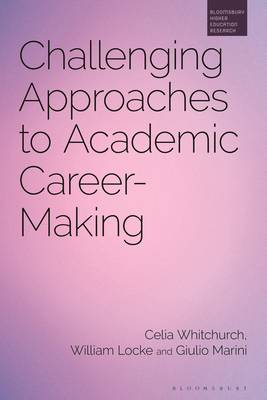
Bedankt voor het vertrouwen het afgelopen jaar! Om jou te bedanken bieden we GRATIS verzending (in België) aan op alles gedurende de hele maand januari.
- Afhalen na 1 uur in een winkel met voorraad
- In januari gratis thuislevering in België
- Ruim aanbod met 7 miljoen producten
Bedankt voor het vertrouwen het afgelopen jaar! Om jou te bedanken bieden we GRATIS verzending (in België) aan op alles gedurende de hele maand januari.
- Afhalen na 1 uur in een winkel met voorraad
- In januari gratis thuislevering in België
- Ruim aanbod met 7 miljoen producten
Zoeken
€ 203,95
+ 407 punten
Omschrijving
Drawing on empirical research, this book develops the concept of career scripts to show how contemporary academic faculty in the UK and other English-speaking countries approach their roles and careers. The career paths of individuals may be informed by personal strengths, interests and commitments, by activity associated with professional practice (represented by Practice scripts), and by formal career structures (represented by Institutional scripts). Internal and Practice scripts have in turn led to new forms of activity, within both formal and informal institutional economies. Whereas the formal economy is represented by, for example, promotion criteria and career pathways, with visible, quantifiable markers, the informal economy is represented by personal interests and initiatives, together with professional relationships and networks that may be unique to the individual.
This book shows how, by drawing on Internal and Practice scripts, individuals develop concertina-like careers, stretching the spaces and timescales available to them. At the same time, they are able to address misalignments and disjunctures that they encounter, including those associated with disciplinary and departmental affiliations, job profiles, progression criteria, and work allocation models. As a result, the authors identify a shift towards more open-ended approaches to roles and careers.
This book shows how, by drawing on Internal and Practice scripts, individuals develop concertina-like careers, stretching the spaces and timescales available to them. At the same time, they are able to address misalignments and disjunctures that they encounter, including those associated with disciplinary and departmental affiliations, job profiles, progression criteria, and work allocation models. As a result, the authors identify a shift towards more open-ended approaches to roles and careers.
Specificaties
Betrokkenen
- Auteur(s):
- Uitgeverij:
Inhoud
- Aantal bladzijden:
- 248
- Taal:
- Engels
- Reeks:
Eigenschappen
- Productcode (EAN):
- 9781350282537
- Verschijningsdatum:
- 4/05/2023
- Uitvoering:
- Hardcover
- Formaat:
- Genaaid
- Afmetingen:
- 156 mm x 234 mm
- Gewicht:
- 517 g

Alleen bij Standaard Boekhandel
+ 407 punten op je klantenkaart van Standaard Boekhandel
Beoordelingen
We publiceren alleen reviews die voldoen aan de voorwaarden voor reviews. Bekijk onze voorwaarden voor reviews.









